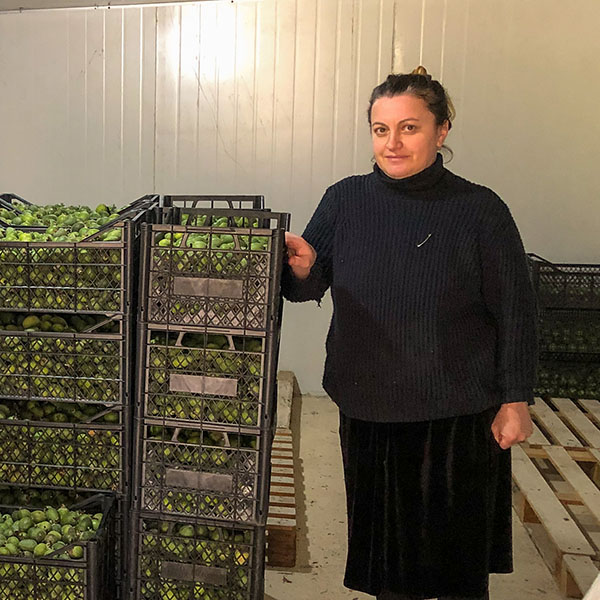Stories of Change

Tamar stands next to some of her cooperative's produce in their cool storage area.
Catching Up With an Old Friend in Georgia
“I live in the village of Kheta in the western part of Georgia,” says Tamar Chumburidze. “I am a mother of three and have two grandchildren. We all live together and our main source of income is a small plot of land where we grow [bay] laurel trees, vegetables and fruit for sale. The income we make is hardly enough to make ends meet and cover basic needs.”
Tamar’s story is all too common in her remote, rural community. Many of her neighbors, especially women, struggle to find jobs or earn a living. There’s also another challenge for families here that compounds everything else: a lack of energy sources. Every day, women and children in particular have to try to find firewood or other biomass that they can burn to heat their homes and cook meals. It’s simply too expensive to try to use gas or electricity to meet even these basic needs.
“The main problem for our family is trying to get fuel to heat the house and cook meals, to sell the fruits and vegetables, to get some inputs to sustain our livelihood. It is very hard to haul heavy firewood every day and travel long distances with such a load. I often get a pain in my knees and my back. In addition, expenses for gas and electricity comprises some 30% of our scarce incomes,” Tamar explained when we were getting to know her.
Several years ago, CWS and our partner Rural Community Development Association teamed up with Tamar and her neighbors to overcome these challenges. Tamar explained, “Thanks to the [CWS]-supported project, we became well aware that if we need to change our lives, we need to do it ourselves. With the support of the program, and together with my neighbors, we initiated a women’s cooperative in our community and organized a drying and cool storage facility for fruits and vegetables that we cultivate on our small plots of land.” Tamar is the head of the women’s cooperative. She and her team use renewable energy (industrial-scale solar dryers) to dry the fruits and vegetables, which they can sell to earn a living.
In 2019, the cooperative was able to add a cool storage facility that the women could use to store their fruits and vegetables to dry later. By waiting until the off season, when demand for dried fruits and vegetables are higher, they could earn more income from their sales.
When we talked to Tamar last year, she told us that every member of the cooperative earned about $210 through the project in 2020. She called it “substantial money during the economic hardship period caused by the COVID-19 pandemic.” She said at the time, “My neighbors and I know that Christmas and the new year will be happy for us and our families, as we’ll have enough fuel for heating and cooking, but also we’ll be able to afford presents for our children and family.”
A year later, in late 2021, we checked in with Tamar again. She proudly told us that the cooperative is still going strong. There are nine women employed at the moment, each of whom earns about $1,420 per year of additional income for their families. “Thanks to the involvement with the cooperative, I have so much more motivation for everything,” Tamar said. “I strive to work better and provide for my family. It also helped me to recover after my husband passed away last year. I managed to become active in social life again thanks to the support I got from colleagues.”
Thank you, CWS family, for walking alongside women like Tamar. Your support has been a lifeline during dark times and a source of joy and hope in the brighter ones.
